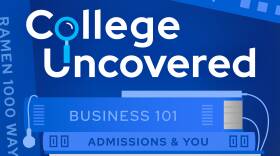After an abysmal season, UMass Amherst’s football program faces scrutiny
UMass Amherst finished the 2025 season winless. As colleges face a looming financial and enrollment crunch, administrators say football still matters for recruiting and relevance.
Podcast: College Uncovered
-
[BONUS] OK Computer. OK College?
Artificial intelligence is still new on college campuses, but it’s already transforming how professors teach and how students learn. Surveys show most students now rely on generative AI for everything from applying to college to getting through it. Some educators are leaning in, treating AI as a teaching partner. Others are leaning out, doubling down on in-person, discussion-based learning. Either way, one thing is clear: AI isn’t going anywhere.This new technology is also reshaping the job market. Young workers are seeing fewer openings in fields most exposed to automation — software development, social media, coding. That’s why colleges are racing to future-proof their programs.In this bonus episode of College Uncovered, GBH’s Kirk Carapezza visits campuses to hear directly from professors and students who are adapting in real time. Harvard physicist Greg Kestin has built a custom chatbot — an “always-on” tutor that mimics himself. Boston College English professor Carlo Rotella, author of What Can I Get Out of This?, sees his unplugged, device-free classes as cutting-edge, urging students to slow down and do the work of building something together themselves. At Wentworth Institute of Technology, faculty are designing a new applied AI degree to give graduates a kind of surfboard to ride the coming digital and labor tsunamis. And Kerry McKittrick, co-director of Harvard’s Project on Workforce, explains what students and families need to know right now about AI and college and how colleges are using AI to boost completion rates and align what they teach with what employers actually need.Additional links: With AI common on campus, some educators are leaning in (GBH)Rather than AI, this professor chooses a chalkboard and old-fashioned books (GBH)Colleges hope to ‘AI-proof’ their offerings as new tech changes job expectations (GBH)Crossing the Great AI Divide (Georgetown University Center on Education and the Workforce)“College Uncovered” is made possible by Lumina Foundation.----------Credits:Host and Producer: Kirk Carapezza Editors: Azita Ghahramani and Jenifer McKimExecutive Producer: Lee Hill Mixing and Sound Design: David Goodman & Gary MottTheme Song and original music: Left-RomanArtwork: Matt Welch Project Manager: Isabel HibbardConsulting Producer and Head of GBH Podcasts: Devin Maverick Robins"College Uncovered" is a production of GBH News -
[BONUS] The New College Compact
Across the country, public universities are being flooded with requests for syllabi, reading lists, course materials, and data on international students. One company is behind many of those requests - Metric Media. Part of a growing network of conservative-led groups, Metric Media says it’s enforcing civil rights laws and holding taxpayer-funded institutions accountable. But critics see something very different: a coordinated pressure campaign emboldened by the second Trump administration that threatens academic freedom and seeks to intimidate scholars. Now some universities are pushing back.In this bonus episode of College Uncovered, GBH’s Kirk Carapezza talks with Brian Timpone, CEO and founder of Metric Media. In a rare interview, Timpone says there’s great public interest in what public universities are teaching students and he thinks America’s public colleges have lost sight of their mission.“Some of the names of these courses, they’re almost like The Onion,” Timpone says.Dan Kennedy, a Northeastern University journalism professor, argues that groups like Metric Media are weaponizing public records laws to pressure and silence professors. We also hear from two faculty members who’ve been targeted: Christopher Petsko, a business professor at the University of North Carolina, and Jennifer Ho, a professor of Ethnic Studies at the University of Colorado–Boulder.And as the Trump administration threatens to withhold federal research funding unless universities sign its proposed “Compact for Academic Excellence in Higher Education,” some schools have already declined.Ted Mitchell, president of the American Council on Education, tells us why he believes the compact would be disastrous for colleges and the country and why you should care.“This is nothing short of a government attempt to make institutions creatures of the state,” Mitchell said. “That’s so antithetical to what higher education is and does. Higher education is about inquiry-based research, discovery-based teaching, and to deprive institutions of the ability to do that is really tantamount to just making them propaganda engines.”The New College Compact explores the escalating battle over academic freedom, political pressure, and the future of higher education in America.Additional links: Local colleges targeted amid growing campus culture warsZombies, Garbage And Vampires? It's Not A Nightmare, It's Your College Course CatalogUn-Welcome to CollegeDEI Backlash“College Uncovered” is made possible by Lumina Foundation.----------Credits:Host and Producer: Kirk Carapezza Editors: Azita Ghahramani and Jenifer McKimExecutive Producer: Lee Hill Mixing and Sound Design: David Goodman & Gary MottTheme Song and original music: Left-RomanArtwork: Matt Welch Project Manager: Meiqian HeConsulting Producer and Head of GBH Podcasts: Devin Maverick Robins"College Uncovered" is a production of GBH News -
Science In Reverse
The government rescinded billions in federal research grants during Trump’s first few months in office — cutting fellowships, scholarships, and postdoc programs that support the next generation of scientists.A federal judge recently ordered the restoration of some National Institutes of Health grants. A battle over National Science Foundation funding is still playing out in court.So what do these cuts actually mean for higher education and scientific discovery? And if the United States gives up its global lead in innovation and research, what does that mean for the rest of us?In this episode of College Uncovered, host Kirk Carapezza and reporter Craig LeMoult visit one public university hit especially hard — and explore what’s really at stake for American science.“College Uncovered” is made possible by Lumina Foundation.----------Credits:Host and Producer: Kirk Carapezza Editor: Jenifer McKimExecutive Producer: Lee Hill Mixing and Sound Design: David Goodman & Gary MottTheme Song and original music: Left-RomanArtwork: Matt Welch Project Manager: Meiqian HeConsulting Producer and Head of GBH Podcasts: Devin Maverick Robins"College Uncovered" is a production of GBH News and The Hechinger Report. -
Why Do Colleges Rarely Revoke Tenure?
Harvard just did something it hasn’t done in decades — it fired a tenured professor.Francesca Gino built her reputation studying honesty. Then she was accused of faking data. In May, Harvard’s top governing board revoked her tenure and ousted her from the Business School.But why is stripping tenure so rare — not just at Harvard, but anywhere? How common is research fraud? And why are colleges so secretive when it happens?College Uncovered’s Kirk Carapezza and reporter Mark Herz unpack the Gino case. Then Kirk sits down with science journalist and attorney Eugenie Reich, author of Plastic Fantastic: How the Biggest Fraud in Physics Shook the Scientific World.“College Uncovered” is made possible by Lumina Foundation.----------Credits:Hosts: Kirk Carapezza & Jon MarcusEditor: Jenifer McKimExecutive Producer: Lee Hill Mixing and Sound Design: David Goodman & Gary MottTheme Song and original music: Left-RomanArtwork: Matt Welch Project Manager: Meiqian HeConsulting Producer and Head of GBH Podcasts: Devin Maverick Robins"College Uncovered" is a production of GBH News and The Hechinger Report. -
S4 Eps 8 Apprentices of the World, Unite!
Is the four-year college degree losing its grip on the American Dream? Just as American colleges reach the demographic cliff in 2026, higher education in the U.S. is facing mounting pressure from all sides. President Donald Trump has targeted several highly-selective, wealthy universities, slashing federal research funding and questioning their tax-exempt status – painting them as overpriced and out-of-touch bastions of liberalism. But skepticism about college isn’t just coming from the right. On the campaign trail, Democratic nominee Kamala Harris called out the country’s narrow focus on four-year degrees, urging more support for apprenticeships and technical programs. And the public seems to agree. A growing number of Americans – nearly a third – now say they have little or no confidence in college. That’s up 10 percent from a decade ago. Employers and states desperate for talent are dropping degree requirements for certain entry-level positions. So where does that leave students and families? And how are colleges, especially those struggling to fill seats, adapting? In this episode of College Uncovered, co-hosts Kirk Carapezza and Jon Marcus dig into the rise of alternative pathways. They explain why there aren’t more apprenticeship and internship opportunities and explore what happens when the college degree is no longer the default. Whether you’re a student, parent, or just interested in the future of higher education, this episode helps explain what comes next.













